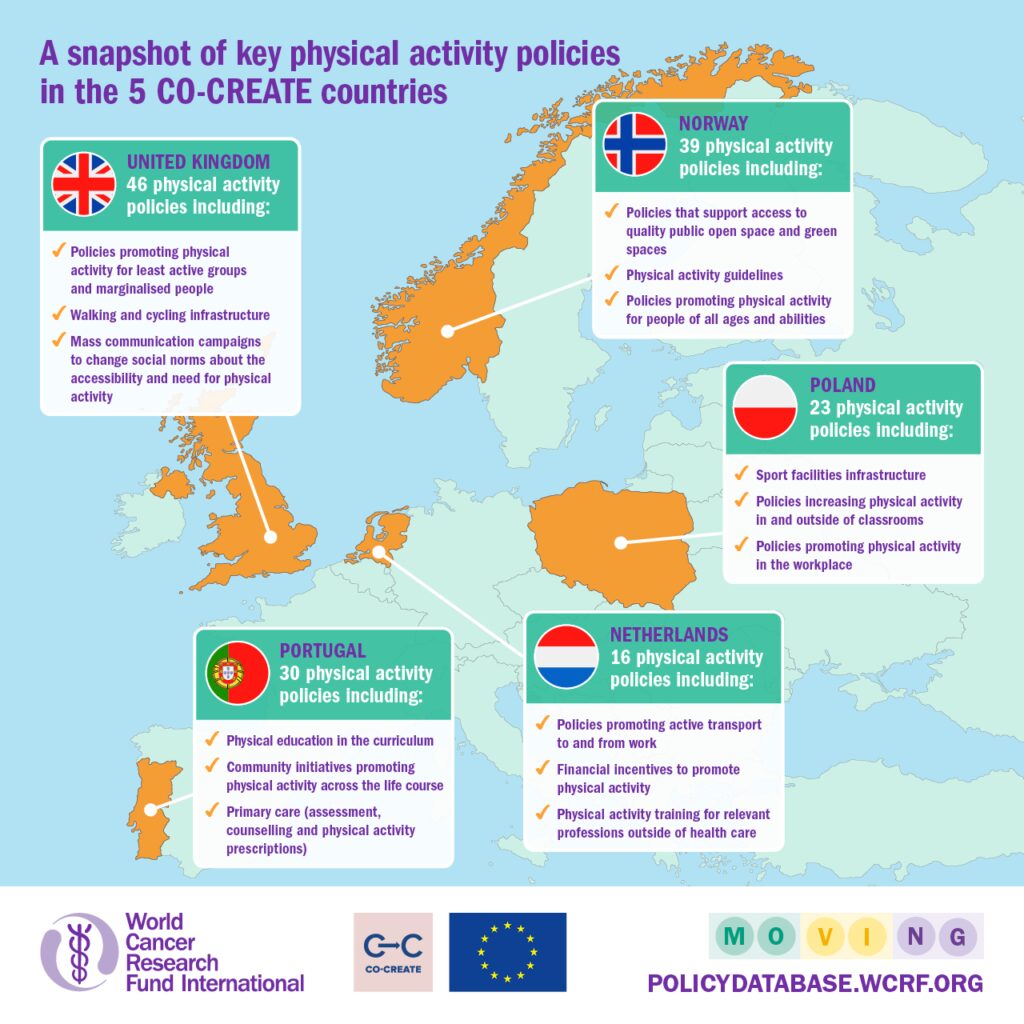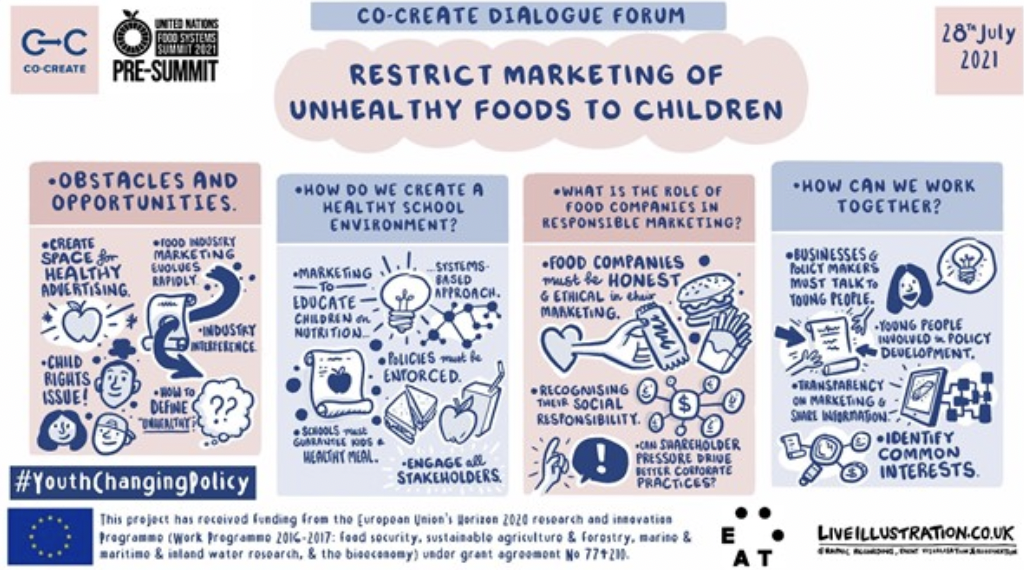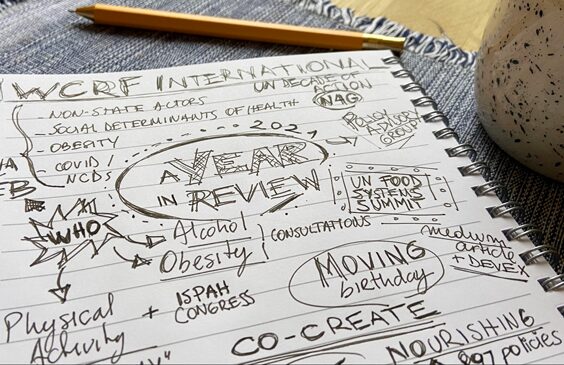January
As part of our Official relations status with the World Health Organization (WHO), we attended the 148th session of the Executive Board (the decision-making body which sets the direction of the WHO) and raised issues including social determinants of health, obesity and NCDs and the role of civil society in WHO governance processes. We will be there again in January 2022 where there is a busy agenda related to NCDs and alcohol so keep an eye for our updates.
February
We observed the annual meeting of the Committee on Food Security and became engaged in ‘action tracks’, which coordinated preparations and identified ideas for the forthcoming UN Food Systems Summit in September.
We also started testing our policy benchmarking tool, developed as part of the EU CO-CREATE project with the aim of contributing to better monitoring of nutrition and physical activity policy environments in Europe.
March
World Obesity Day was marked, to raise global awareness on issues around obesity prevention and control. As obesity is a key risk factor for cancer, we wholeheartedly supported the day. World Cancer Research Fund’s Cancer Prevention Awareness Week shared advice around cancer risk reduction to a UK audience.
We provided comments as part of WHO web-based consultation on the Global Coordination Mechanism for Non-Communicable Diseases.
April
We virtually attended the first WHO informal civil society session, designed to engage civil society in discussions with member states and the WHO Secretariat. We had the chance to highlight our thoughts about how civil society can collaborate even more strongly with WHO and asked a question to the WHO DG Dr Tedros on how NCD prevention can be integrated into pandemic preparedness.
We also presented our MOVING physical activity policy database at a World Obesity launch webinar on new physical activity dossier.
May
For the World Health Assembly, we prepared statements on social determinants of health, integrating NCDs into COVID-19 response, and WHO reform. It was a positive Assembly from the perspective of NCDs, with resolutions passed on oral health and diabetes, which share risk factors with cancer.
We reconvened our Policy Advisory Group, which brings together leading civil society representatives, policymakers and academics with expertise and knowledge on NCD prevention policies in diet, nutrition, and physical activity. They provide strategic and technical advice on our evidence-for-policy and advocacy work. We developed a workplan with activities such as developing new publications, high level advocacy moment and strategic advice.
We also attended the European Congress on Obesity to hear latest updates on policy initiatives. We’re excited to be submitting an abstract for the 2022 Congress.
June
Our MOVING physical activity policy database turned 1, and we celebrated by reflecting on what we have found and on how much the database has grown in the past year.

A map of physical activities policies in 5 countries
July
We took part in a side event at the UN Food System Pre-Summit and shared perspectives on the need to design and implement junk food marketing restrictions and the importance of involving youth in creating healthier food environments.

We also published a new summary of our Building Momentum report on front of pack labelling.
August
We had a break after a busy summer and took some time to prepare for a jam-packed autumn ahead.
September
A WHO Obesity consultation sought to develop new recommendations and targets for member states – we contributed our expertise.
We submitted a response to the WHO consultation on the first draft of the action plan (2022 – 2030) to effectively implement the Global strategy to reduce the harmful use of alcohol, calling, among others, for updating the term “harmful use of alcohol” to “alcohol use” and/or “alcohol harms” and reassessing the role assigned to the alcohol industry.
Our Board signed off our new Policy and Public Affairs Strategy, which maintains our focus on advocacy, evidence for policy and working with our network charities – a copy will be published on our website next year.
In the days running up to the UN Food Systems Summit we published an article outlining our concerns about strengthening the connections between food and health and the role food plays in diet-related NCDs. Following the summit we shared our thoughts about whether it would generate the food systems transformation it set out to achieve. We also published a follow up piece on how good governance will underpin the delivery of global targets generated by the summit.
October
We promoted WHO’s new advocacy brief called “Fair Play: Building a strong physical activity system for more active people”, which supports stronger multisectoral action to promote physical activity and we explored what stops the world from being physically active. (Check out our other blog on how the built environment influences our physical activity levels)
We also gave a teaser into our new benchmarking tool in a presentation during the ISPAH Congress 2021 where we assessed the strength of a sample of physical activity policies in 5 European countries.
Our Executive Director of Science and Public Affairs, Dr Kate Allen, participated in a panel discussion at the World Cancer Leaders’ Summit to discuss how better connect research to policies that can address the cancer burden and promote equity, especially in the next stage of our signature research interpretation project – the Continuous Update Project.
November
We watched the world convene for COP26 to see how climate change action can be stepped up. We’ll be looking at the links between cancer and climate change in 2022.
Another teaser of our benchmarking tool was presented at the European Public Health Congress, outlining some preliminary results of benchmarked marketing and taxation policies from 5 countries.
December
We virtually attended the Nutrition 4 Growth Summit, hosted by the Government of Japan, to see member states and donors pledge action and resources to support nutrition.
Our NOURISHING and MOVING policy databases, which have been developed through our work on the CO-CREATE project, now hold 897 nutrition related policies from 135 countries and 485 policies promoting physical activity from 22 countries. You can find out more about the databases through our newly published summary introductions:
Things to look out for in 2022…
- World Cancer Day – 4 February
- World Obesity Day – 4 March
- Launch of a WHO Euro report on obesity
- Preparations for the next UN High Level Meeting on NCDs in 2025
- WHO Global Alcohol Action Plan – Spring 2022
- The launch of the WHO Global Status Report on Physical Activity
- The launch of the WCRF International policy benchmarking tool
- More policies added to our NOURISHING and MOVING databases
Subscribe on YouTube to our unmissable monthly policy roundups. We will be back in 2022 – wishing you all the best for the holiday season and the new year!
